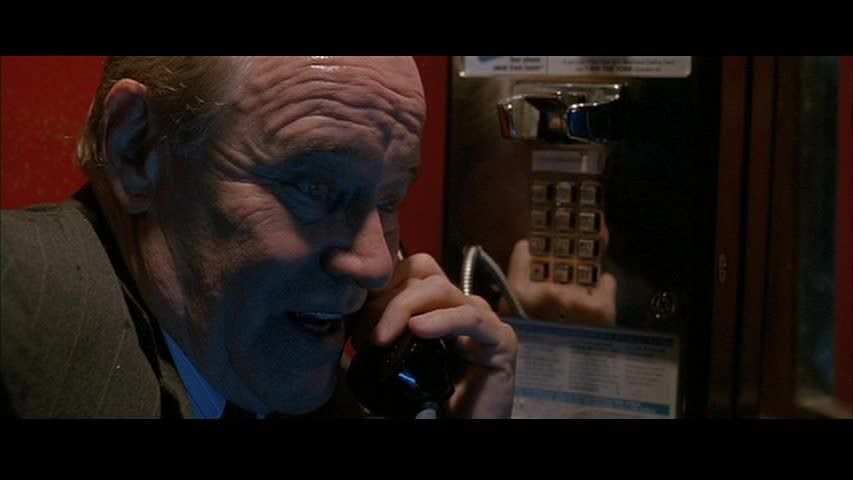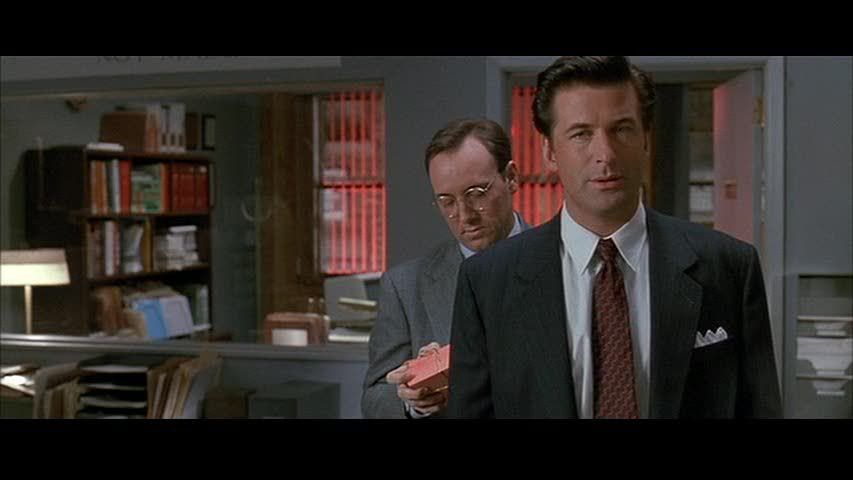
Adapted from one of David Mamet's plays by Mamet himself, Glengarry Glen Ross is severely constrained by the stagebound nature of its material, giving it a claustrophobic, airless quality that director James Foley does nothing to mitigate. The story of a group of real estate salesmen struggling to meet rigid sales goals with the threat of losing their jobs dangling over their heads, the script mainly consists of a set of repetitious, utterly circular conversations in which these angry, frustrated men rant and rave, spewing vulgarity and saying the same things over and over again. Their leads are no good. They can't close these leads. The leads are shit. The leads are fucking shit. The boss is a no-good cocksucker. They curse a lot: a lot. Mamet seems to think that realism means having his characters say "fuck" every other word and constantly repeat themselves, but the result is merely strained and, very quickly, exhausting. It doesn't help that Foley has only the most pedestrian solutions for directing most of these conversations. In a movie that consists of virtually nothing but one long, heavily stylized conversation or monologue after another, it is absolute cinematic torture when the director can think of nothing better to do than to cut, on the dialogue, back and forth from one closeup to another, occasionally varying things with a two-shot. In some of the more quickly paced conversations, it even becomes unintentionally kind of funny, as Foley cuts back and forth between actors exchanging quick words or bits of words, the syncopated rhythms of the editing completely disrupting the sense that the actors are even in the same room with one another, let alone sitting at the same table. It's maddeningly distracting.
The film's basic idea certainly has some promise to it. A bunch of down-and-out salesmen are working on squeezing the last bits of life out of their mostly dead prospects. The best of them is Ricky Roma (Al Pacino), who's on a streak of luck. Meanwhile, neither the stuttery, awkward George (Alan Arkin) nor slick old-timer Shelley (Jack Lemmon) have done much of anything lately, and even the cocksure, abrasive Moss (Ed Harris) is struggling. They're all overseen by the smug, rigid office manager Williamson (Kevin Spacey), and they're given some fiery "motivation" by a representative of the uptown head office, the priggish Blake (Alec Baldwin), who gives the salesmen an ultimatum: make the top two slots this month or get out. There's some high-powered acting talent on display here, even if this stellar cast isn't given much to do besides bluster endlessly. The script has so much spit and venom that none of these great actors are really able to add much depth or nuance to their one-dimensional characters, with one very notable exception.
In a film mostly populated by soulless caricatures with no substance, Jack Lemmon's Shelley shines as the one decent, truly fleshed-out portrayal of the bunch. Other than Arkin's non-entity wallflower, Lemmon's is the only performance that consists of more than cursing at the top of his lungs. He takes the script's vulgarity and broad strokes and makes them his own, really sinking into this character, living it, writing it in the lines of his face and the earnest, pleading quality in his voice. There's more than a little Willy Loman in his over-the-hill salesman, still ready with lots of fast talk and slick double-dealing, but no longer having the numbers to back up his skill. He insists he's just hit a streak of bad luck, but nobody cares, focusing only on what he's done lately. Lemmon brings his quiet dignity and reserve to the film, adding much needed subtlety to a script that is otherwise inclined to use bigger and bigger hammers to hit its tiny nails. The film's apparent messages — about the uselessness of a life dedicated only to a soulless job — are most forcefully felt in the character of Shelley.

Foley also reserves his most potent directorial flourish for Shelley's pivotal moment, after he finally succeeds on an important sales call and is describing his victory to Roma. As Shelley describes his sale in hushed, quasi-spiritual tones, the camera drifts airily backward, forsaking the back-and-forth cutting on dialogue to take in the whole scene in the office, with a low angle shot that increasingly isolates the two salesmen in the center of this big empty space. It's a shame that Foley isn't able to expand upon the material like this more often. It's a lovely shot, commenting on the emptiness of Shelley's victory even as it captures his very real enthusiasm and nearly ecstatic joy. Elsewhere, the exterior shots, bathed in neon colors and pouring rain, are evocative but don't really add up to anything. And Foley's simplistic way of dealing with the vast majority of the dialogue scenes drags the life out of them, even if there are still some sparks in the best patches of Mamet's dialogue. There's a truly great sequence in which Roma delivers a lengthy, rambling monologue about absolutist morality, attitude, religion, and the importance of personal choice. It is a speech of astonishing amorality, and the scene's payoff comes when Roma climaxes this dazzling oration by whipping out a sales brochure and spreading it out on the table in front of his slack-jawed companion: all this eloquence and ranting for the sake of selling a parcel of Florida real estate.
At its best moments, like this, the film has the capacity to surprise with its dark wit and harsh insights; its mordant satire has some real sharp teeth. But its rambling structure, functional style and repetitive dialogue diminish the material's potential. Large chunks of the film are dedicated to hammering home the same points repeatedly, particularly anything involving Harris or Arkin, who play the same note throughout as though they're incapable of hitting any other. The scenes where the two of them are talking together are thus doubly exhausting, especially since they converse at length throughout the whole first half of the film. There's the foundation of an interesting film here somewhere, but the film that actually got made isn't it. Despite flashes of quality, and even sporadic brilliance, Glengarry Glen Ross is mostly monotonous and cinematically limited.







0Awesome Comments!